As famous for his thrill-seeking lifestyle and publicity stunts as for his vast business empire, Richard Branson can now check “astronaut” off his to-do list after successfully completing his first spaceflight.
The avowed Star Trek fan attributed his drive and taste for adventure to his mother Eve, who died from COVID-19 in January.
“Dear Mum, you always told me to reach for the stars. Well, I took my own winding road, but I always knew to follow your lead,” he said in a video tribute that aired before the VSS Unity spaceplane took off on Sunday.
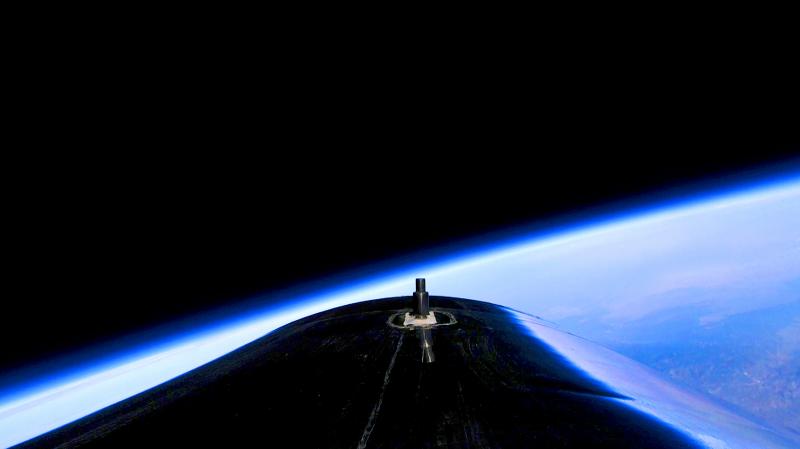
Photo: AP
The Virgin group boss, whose net worth amounts to US$5.7 billion according to Forbes magazine, made his initial fortune in the record industry in the 1970s.
The London-born entrepreneur, now 70, has since launched a string of successful companies in sectors as diverse as railways and mobile phones, as well as Virgin Atlantic airlines.
But there have been plenty of missteps.
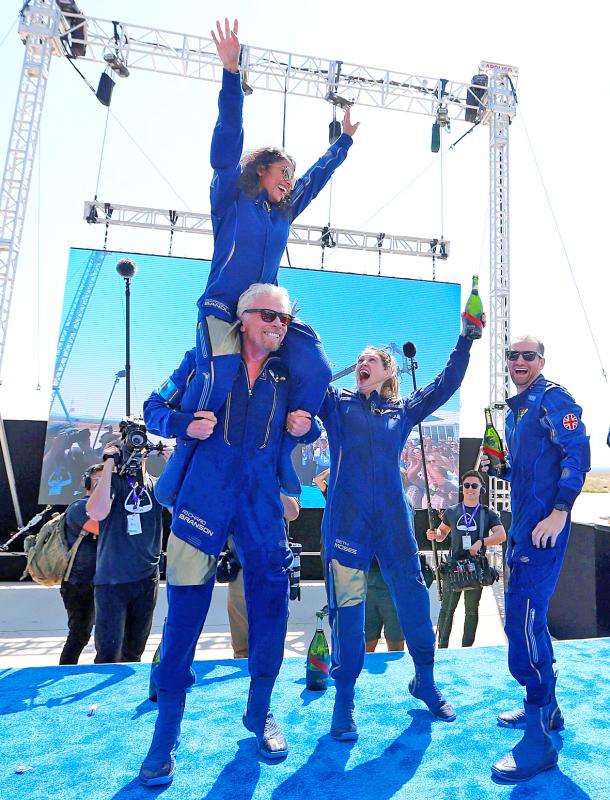
Photo: Reuters
His failures include a short-lived attempt at Formula One racing, a stab at the soft drinks market with Virgin Cola, and a wedding company called Virgin Bride, which some said existed only because of the name.
EARLY BREAKTHROUGH
Branson was said to have been a below-average student who suffered from dyslexia, with his headmaster at a private school in southern England apparently telling him he would either go to prison or become a millionaire. He set up Virgin Records when he was just 20 and earned his first million pounds three years later, buying his own Caribbean island a few years afterwards.
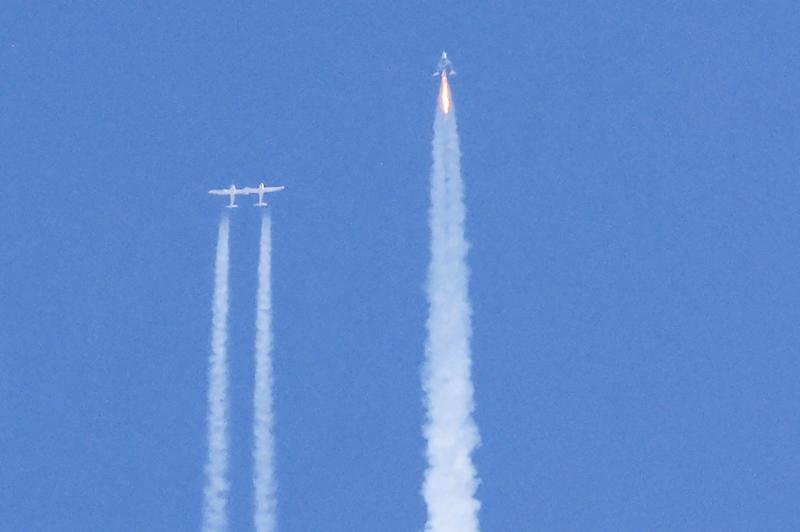
Photo: Reuters
The record label’s breakthrough came with Tubular Bells, a 1973 instrumental album by the British musician Mike Oldfield, which sold millions of copies.
His mother was a flight attendant, so perhaps he was following in the family footsteps when he set up his airline in 1984.
But his business practices and publicity stunts since then have irked many.
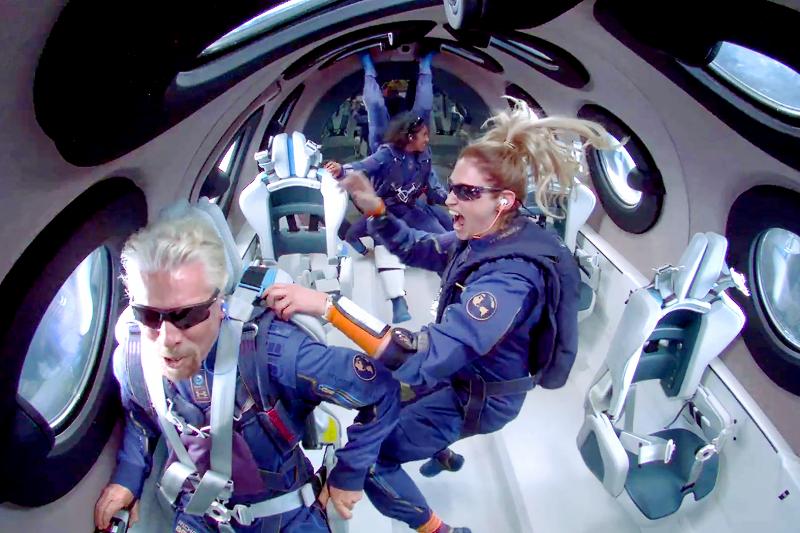
Photo: Reuters
In 2006, it emerged that Virgin Atlantic and British Airways had engaged in price fixing, though his firm avoided any punishment because they tipped off the authorities.
And last year, Branson asked the British government for US$694.5 million to help Virgin Atlantic weather the economic fallout of the COVID lockdown, despite having paid no income tax in Britain for more than a decade.
Politicians accused him of “milking the system.”
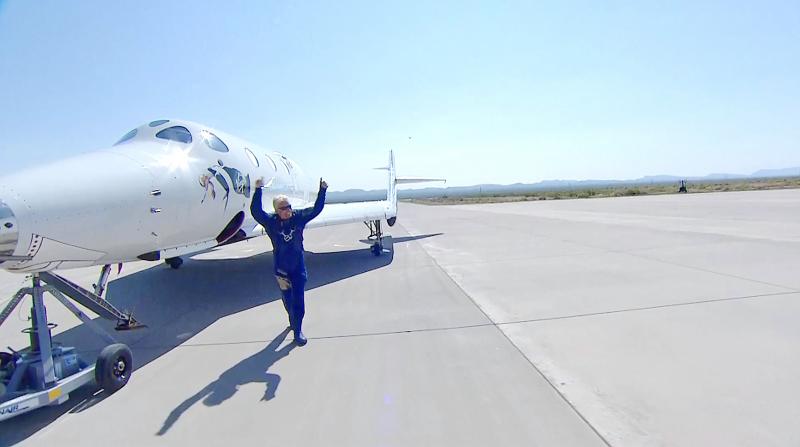
Photo: EPA-EFE
In 2012, a columnist for The Guardian newspaper compared Branson to the WikiLeaks founder Julian Assange “in that both believe the world revolves around them.” That was a bit ironic, as Branson has tried and failed several times to become the first person to go around the world nonstop in a balloon.
‘SPACE IS HARD’
At the age of 28, Branson bought Necker Island, where he has hosted lavish parties and getaways for celebrities and political leaders including former US president Barack Obama and his wife Michelle.
Much of the publicity surrounding Branson over the years has been based around his adventuring; he has tackled a number of records in speedboats, balloons and even an amphibious car.
These exploits brought him close to tragedy in 1998, when he and his co-pilot were forced to ditch their balloon in the Pacific Ocean after low pressure forced the craft down. His efforts in recent years have focused on his space tourism company, founded in 2004 and based in the Mojave desert in California.
Branson, who was knighted in 2000 for his services to entrepreneurship, had hoped to join a commercial flight with Virgin Galactic as early as 2009.
But its timeline was hit by a series of delays, including a tragic crash in 2014 that claimed the life of a test pilot.
Ever the showman, Branson unveiled a Willy Wonka-esque competition for space enthusiasts to win two free tickets on Virgin Galactic flights, following Sunday’s successful flight.
“I promise lots of chocolate,” he joked, comparing himself to the beloved Roald Dahl character.

On April 26, The Lancet published a letter from two doctors at Taichung-based China Medical University Hospital (CMUH) warning that “Taiwan’s Health Care System is on the Brink of Collapse.” The authors said that “Years of policy inaction and mismanagement of resources have led to the National Health Insurance system operating under unsustainable conditions.” The pushback was immediate. Errors in the paper were quickly identified and publicized, to discredit the authors (the hospital apologized). CNA reported that CMUH said the letter described Taiwan in 2021 as having 62 nurses per 10,000 people, when the correct number was 78 nurses per 10,000

As we live longer, our risk of cognitive impairment is increasing. How can we delay the onset of symptoms? Do we have to give up every indulgence or can small changes make a difference? We asked neurologists for tips on how to keep our brains healthy for life. TAKE CARE OF YOUR HEALTH “All of the sensible things that apply to bodily health apply to brain health,” says Suzanne O’Sullivan, a consultant in neurology at the National Hospital for Neurology and Neurosurgery in London, and the author of The Age of Diagnosis. “When you’re 20, you can get away with absolute

May 5 to May 11 What started out as friction between Taiwanese students at Taichung First High School and a Japanese head cook escalated dramatically over the first two weeks of May 1927. It began on April 30 when the cook’s wife knew that lotus starch used in that night’s dinner had rat feces in it, but failed to inform staff until the meal was already prepared. The students believed that her silence was intentional, and filed a complaint. The school’s Japanese administrators sided with the cook’s family, dismissing the students as troublemakers and clamping down on their freedoms — with

As Donald Trump’s executive order in March led to the shuttering of Voice of America (VOA) — the global broadcaster whose roots date back to the fight against Nazi propaganda — he quickly attracted support from figures not used to aligning themselves with any US administration. Trump had ordered the US Agency for Global Media, the federal agency that funds VOA and other groups promoting independent journalism overseas, to be “eliminated to the maximum extent consistent with applicable law.” The decision suddenly halted programming in 49 languages to more than 425 million people. In Moscow, Margarita Simonyan, the hardline editor-in-chief of the